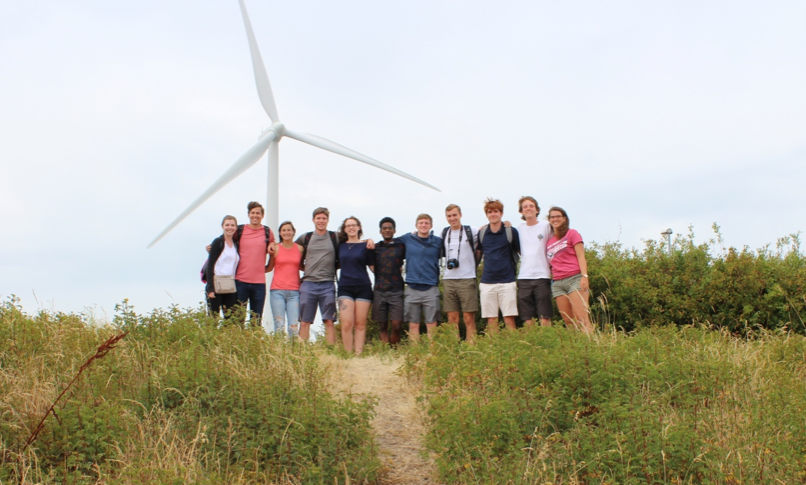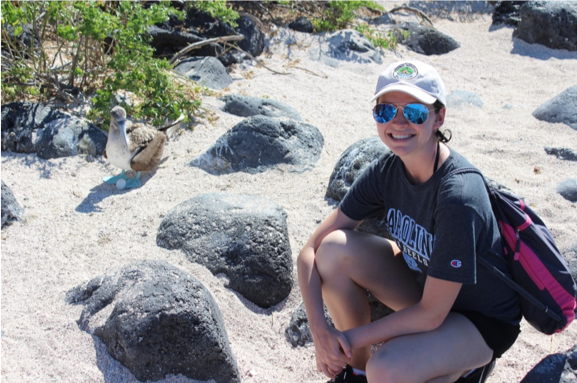By Erin Danford
Erin Danford is a senior Environmental Science major and Geography minor at UNC-Chapel Hill. Erin serves as the student representative on the UNC Institute for the Environment Board of Visitors.
Unique Learning Experiences
It’s a common cliché that students love to brag about their time abroad. For a history major, Athens is the ultimate study abroad destination. For a textiles student, maybe it’s Milan. For an environmental science major, it’s Galápagos.
One of the reasons I initially decided to study at Carolina is because I wanted to go abroad. Now, four years later, I’m one of the few students who was lucky enough to do so twice. The summer of 2017, I joined the Institute for the Environment’s Dr. Greg Gangi and two dozen other Carolina students on the Burch Field Research Seminar in Germany and the Netherlands.

The program lasted six weeks and focused on renewable energy and city planning. In less than two months, I visited more than twenty different cities in four countries. We biked through the Netherlands, visited solar technology research institutions in Germany, and hiked through the Black Forest to a French castle (because what else do you do on a German holiday?). While on the trip, I received six hours of course credit (all of which counted toward my major) and formed relationships that helped me get an internship at a North Carolina solar company the summer after.
However, once the travel bug bites you, you’re hooked. In the fall of 2018, I went abroad again, this time to Ecuador and the Galápagos. The UNC Institute for the Environment in partnership with the Carolina Study Abroad programruns a field site in Galápagos sending a small cohort of students to study in the remote islands. The program is normally offered in the spring and summer. However, I was going to graduate in the spring (and didn’t want to miss basketball season), so Dr. Gangi—my ever-trusted advisor from the Burch trip—suggested I break tradition and complete the field site in the fall.
A few months later, I was on a plane to Quito, Ecuador. This time, I was gone for a full semester, giving me an opportunity to live with two host families, become fluent in Spanish, and take classes with Ecuadorian students. Living in San Cristóbal, Galápagos was an experience like no other. I had to move baby sea lions from the bike racks to go to class and took more than a few selfies with the famous blue-footed boobies.

Classroom Credit a World Away
For many students, a major barrier to studying abroad is the fear that doing so will reduce their chance of graduating on time. The beauty of the Institute for the Environment field sites is that I never had that concern. All of the classes are specific to fields of environmental science, rather than the typical general education classes that students often take in Paris or Florence, and every class I took counted toward my environmental science degree.
Instead of holding me back from completing my degree, my study abroad experiences are the highlight of my resume.
Rather than taking French language or basic European history, I studied the German energy transition, wildlife conservation biology in the Ecuadorian Amazon, and marine life in the Galápagos Islands. Instead of holding me back from completing my degree, my study abroad experiences are the highlight of my resume.
Looking back, my time abroad was an integral part of my undergraduate experience, but the trips also inspired my post-graduation plans. While on the Burch Field Research Seminar, I was fascinated by the green innovations of Northern Europe, especially in the small German city of Freiburg. I loved the city so much I decided to go back.
This year, I applied for a Fulbright Fellowship to complete a masters degree at the University of Freiburg, where I plan to study Environmental Governance (conveniently taught completely in English). In fact, I had my Fulbright interview while still in the Galápagos. Unfortunately, the internet out in the islands is incredibly unreliable. I mentioned the interview to the UNC Science Center in Galápagos, and they assured me that they’d redirect all the island’s satellite internet to the science center so I could do my Skype interview. Just goes to show that UNC will support you wherever you go!
Through the generosity of donors, the UNC Institute for the Environment is able to offer a limited number of scholarships and awards for the field site programs. Learn more about experiential educational opportunities at the UNC Institute for the Environment field site programs by visiting: https://ie.unc.edu/education/field-sites/

